[Zodiac Signs]: Unraveling the Mysteries Behind Astrological Signs
Zodiac:
The Zodiac Signs, as it is known in astrology and astronomy, is a belt of stars that stretches 9° on either side of the ecliptic, which is the plane of Earth’s orbit and the Sun’s apparent annual path. The Moon’s and the planets’ orbits are fully contained within the zodiac. It is thought that each of the zodiac’s 12 astrological signs occupies 1/12, or 30°, of its great circle.
Understanding Astrology: Points to Consider
- Inclusive Nature of Astrology:
- In astrology, there are no winners or losers; rigid boundaries vanish in the metaphysical domain.
- Astrology encompasses various practices such as tea leaf reading, tarot cards, and celestial interpretations.
- Significance of Every Zodiac Sign:
- Each sign in astrology holds importance and is a crucial component of the zodiac.
- The elements (earth, fire, water, and air) collaborate to shape individuals’ personalities and traits.
- Complexity and Nuance of Astrology:
- Astrology is intricate, yet at its core, it revolves around the 12 well-known star signs.
- Each sign possesses distinct qualities, associations (myths, animals, colors), viewpoints, strengths, and weaknesses.
- Understanding Sun Signs:
- Astrology primarily focuses on the “sun sign,” determined by the date of birth, which represents one’s basic identity, preferences, romantic tendencies, and worldview.
- The sun sign forms a celestial profile that, in conjunction with other planetary positions, reflects an individual’s desires, joys, shortcomings, and fears — essentially, their cosmic fingerprint.
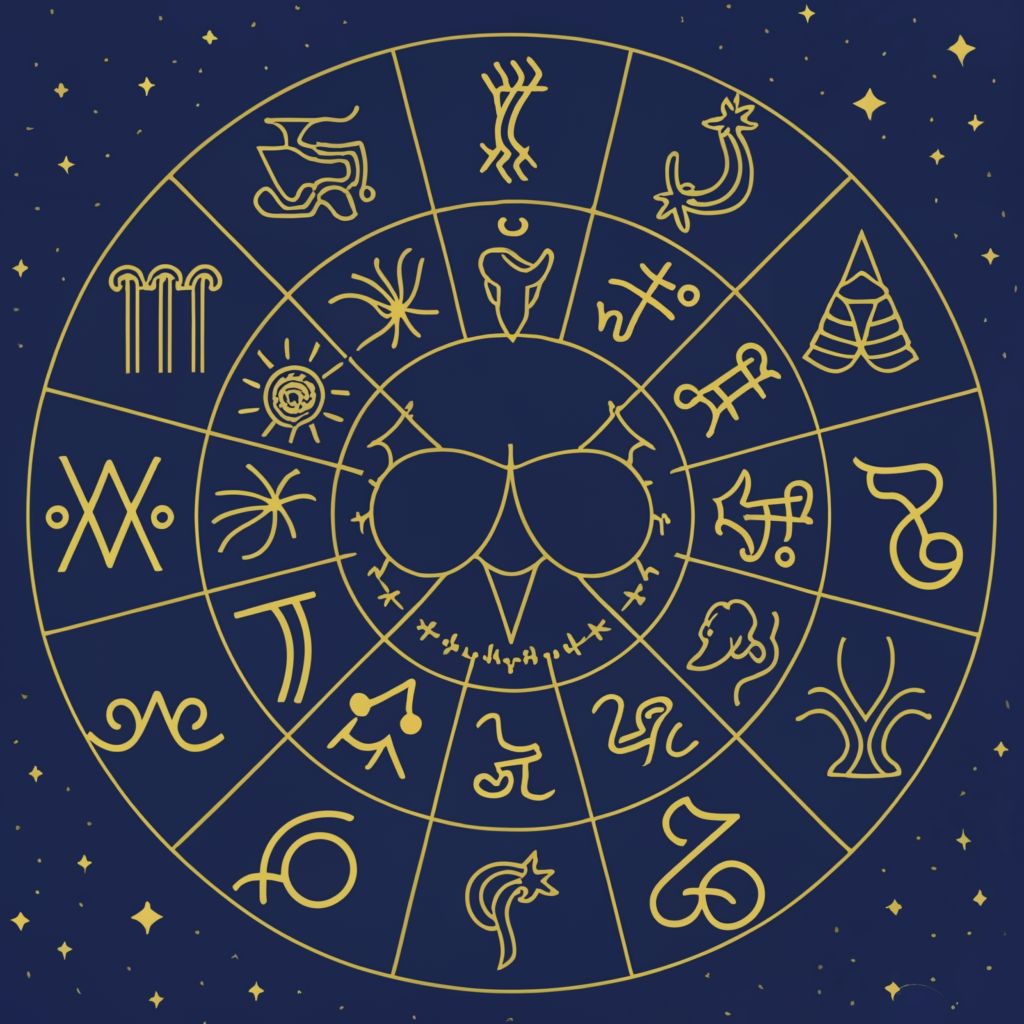
There are two more subgroups of the Zodiac signs: three quadruplicities and four triplicities.
Triplicities in Zodiac signs:
| Element | Signs |
|---|---|
| Fire | Aries, Leo, Sagittarius |
| Earth | Taurus, Virgo, Capricorn |
| Air | Gemini, Libra, Aquarius |
| Water | Cancer, Scorpio, Pisces |
- Fire Signs (Aries, Leo, Sagittarius):
- Fire signs are characterized by passion, enthusiasm, and exuberance.
- Individuals born under fire signs are often dynamic, energetic, and adventurous.
- They are driven by inspiration and creativity, often pursuing their goals with fervor and determination.
- Earth Signs (Taurus, Virgo, Capricorn):
- Earth signs are known for their practicality, stability, and grounded nature.
- People belonging to earth signs are reliable, hardworking, and focused on tangible achievements.
- They possess a strong sense of responsibility and are skilled at building solid foundations for success.
- Air Signs (Gemini, Libra, Aquarius):
- Air signs are characterized by intellect, communication, and curiosity.
- Individuals under air signs are analytical, sociable, and open-minded.
- They excel in communication and thrive on exchanging ideas and information with others.
- Water Signs (Cancer, Scorpio, Pisces):
- Water signs are known for their emotional depth, intuition, and sensitivity.
- People born under water signs are empathetic, compassionate, and deeply attuned to their emotions.
- They possess a strong intuition and are often drawn to creative pursuits and spiritual exploration.
Quadruplicities Zodiac signs:
- Cardinal Signs (Aries, Cancer, Libra, Capricorn):
- Cardinal signs mark the beginning of a new season and excel at taking action and initiating change.
- Individuals born under cardinal signs are dynamic, ambitious, and proactive in pursuing their goals.
- They are natural leaders who thrive in positions of authority and are not afraid to take the initiative.
- Fixed Signs (Taurus, Leo, Scorpio, Aquarius):
- Fixed signs occur in the middle of seasons and represent stability, consistency, and endurance.
- People with fixed signs are known for their steadfastness, determination, and resilience.
- They are reliable and unwavering in their commitments, often serving as anchors during times of change.
- Mutable Signs (Gemini, Virgo, Sagittarius, Pisces):
- Mutable signs occur at the end of a season and possess adaptability, flexibility, and versatility.
- Individuals born under mutable signs are adept at navigating change and embracing new opportunities.
- They are resourceful problem-solvers who excel in diverse environments and thrive on exploration and growth.
Exploring Sun Sign Personalities
- Astrology unveils a rich and complex practice that offers insights into our truest selves.
- Each sun sign possesses unique personality attributes, ranging from honorable traits to areas of improvement.
- Self-awareness is the cornerstone of self-actualization, and delving into astrological insights can aid in understanding oneself and unlocking individual potential.
- By exploring sun sign characteristics, individuals can gain deeper insights into their own special magic and embark on a journey of self-discovery and personal growth.
History:
Uncovering the History of the Zodiac
- Origins of the Zodiac:
- The term “zodiac” originates from the Greek words “zōdiakos kyklos,” meaning “circle of animals,” reflecting the animal-shaped constellations through which the Sun appears to pass.
- The zodiacal constellations were not always fixed in number or size and were formalized with the development of mathematical astronomy.
- Development of Astrological Signs:
- The list of zodiacal constellations, along with the dates of the Sun’s passage through them, was established in antiquity.
- Despite shifts caused by the precession of the equinoxes, the dates remain associated with astrological signs, even though the Sun’s direction has changed relative to the constellations.
- Historical Roots of Western Astrology:
- Western astrology is a direct continuation of Hellenistic astrology, notably recorded in Ptolemy’s Tetrabiblos in the 2nd century.
- Hellenistic astrology drew upon Babylonian traditions, especially the division of the ecliptic into twelve equal sectors, which originated in Babylonian astronomical concepts.
- Influence of Babylonian and Egyptian Astronomy:
- By the 4th century BC, Babylonian astronomy and celestial omens influenced ancient Greek culture, as did Egyptian astronomy by the late 2nd century BC.
- This led to the development of Horoscopic astrology, which focused on individual birth charts and employed concepts like the Ascendant and the twelve houses.
- Association with Classical Elements:
- An important development in characterizing the twelve signs was the association with Empedocles’ four classical elements, reflecting the influence of Greek philosophical thought.
- Ptolemy’s Tetrabiblos:
- Ptolemy’s Tetrabiblos serves as a seminal work in Hellenistic astrological tradition, influencing later astronomical traditions in the West, India, and the Islamic sphere.
- Its teachings, largely unchanged for almost seventeen centuries, provided a foundational reference for astrological practice and interpretation.
Zodiac Sign Dates:
| Zodiac Sign | Dates | Symbol |
|---|---|---|
| Aries | March 21 – April 19 | ♈ (Ram) |
| Taurus | April 20 – May 20 | ♉ (Bull) |
| Gemini | May 21 – June 21 | ♊ (Twins) |
| Cancer | June 22 – July 22 | ♋ (Crab) |
| Leo | July 23 – August 22 | ♌ (Lion) |
| Virgo | August 23 – September 22 | ♍ (Virgin) |
| Libra | September 23 – October 23 | ♎ (Balance) |
| Scorpio | October 24 – November 21 | ♏ (Scorpion) |
| Sagittarius | November 22 – December 21 | ♐ (Archer) |
| Capricorn | December 22 – January 19 | ♑ (Goat) |
| Aquarius | January 20 – February 18 | ♒ (Water Bearer) |
| Pisces | February 19 – March 20 | ♓ (Fish) |
Aries (Ram): March 21–April 19:
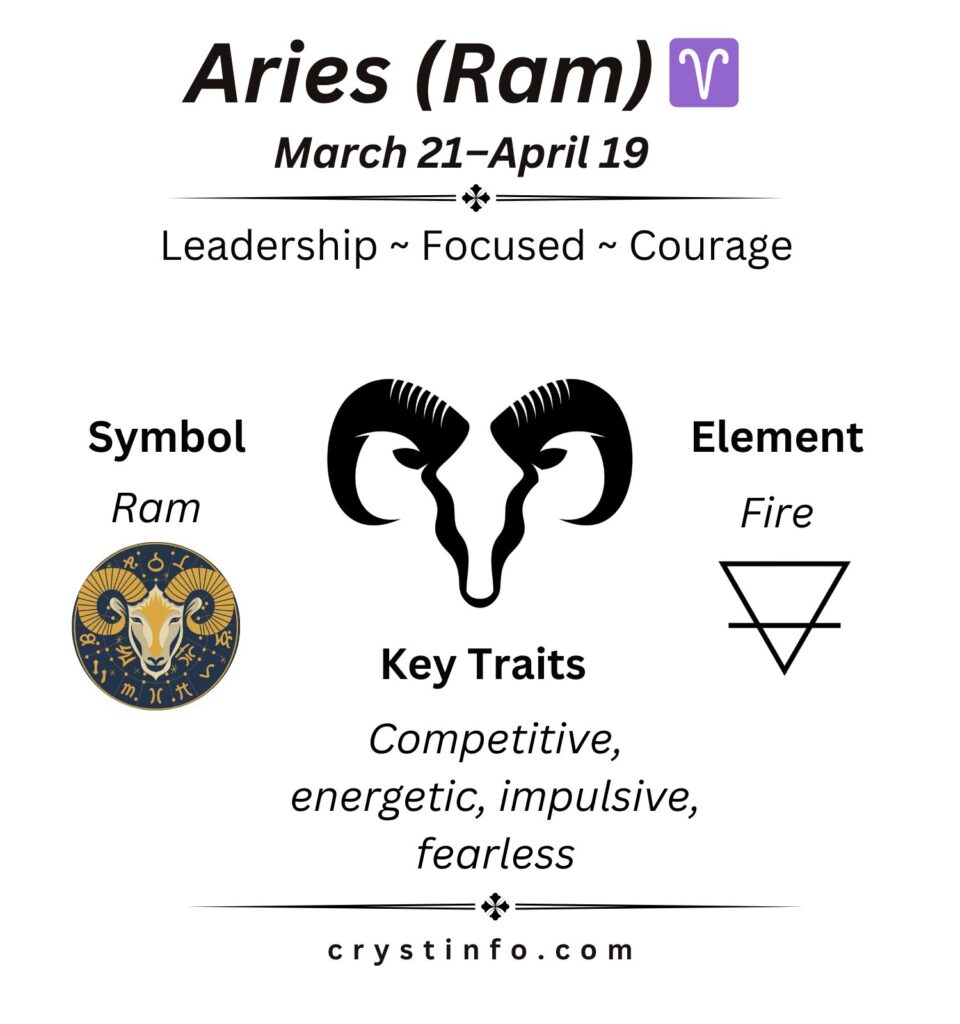
Aries: The Constellation
| Aries Traits | Description |
|---|---|
| Symbol | The Ram |
| Ruling Planet | Mars |
| Ruling House | First House of Self |
| Key Traits | Competitive, energetic, impulsive, fearless |
- Astronomical Characteristics:
- Aries is a zodiacal constellation located in the northern sky, positioned between Pisces and Taurus.
- Its coordinates are approximately 3 hours right ascension and 20° north declination.
- Aries contains no exceptionally bright stars, with the brightest star, Hamal, having a magnitude of 2.0.
- The vernal equinox, or the first point of Aries, marks the intersection of the celestial equator with the apparent annual pathway of the Sun.
Legend Behind the Zodiac Sign Aries
- Astrological Significance:
- In astrology, Aries is the first sign of the zodiac, governing from around March 21 to April 19.
- The vernal equinox, which was once located in Aries, has shifted into Pisces due to the precession of the equinoxes.
- Mythological Associations:
- Aries is symbolically represented as a ram and is associated with the Egyptian god Amon and Greek mythology’s ram with the golden fleece.
- In Greek mythology, Phrixus, the son of King Athamas, rode the ram with the golden fleece to Colchis, where it was sacrificed to Zeus and placed in the heavens as the constellation.
Traits of Aries in Astrology
- Dynamic and Competitive Nature:
- Aries, as the first sign of the zodiac, embodies traits of ambition, boldness, and a competitive spirit.
- Individuals born under the sign of Aries are known for their willingness to dive headfirst into challenges and ensure they emerge victorious.
- They have a natural drive to be number one and thrive in competitive environments.
Overall, Aries exhibits a dynamic and assertive personality, eager to tackle obstacles and assert its dominance in various aspects of life.
Taurus (Bull): April 20–May 20:
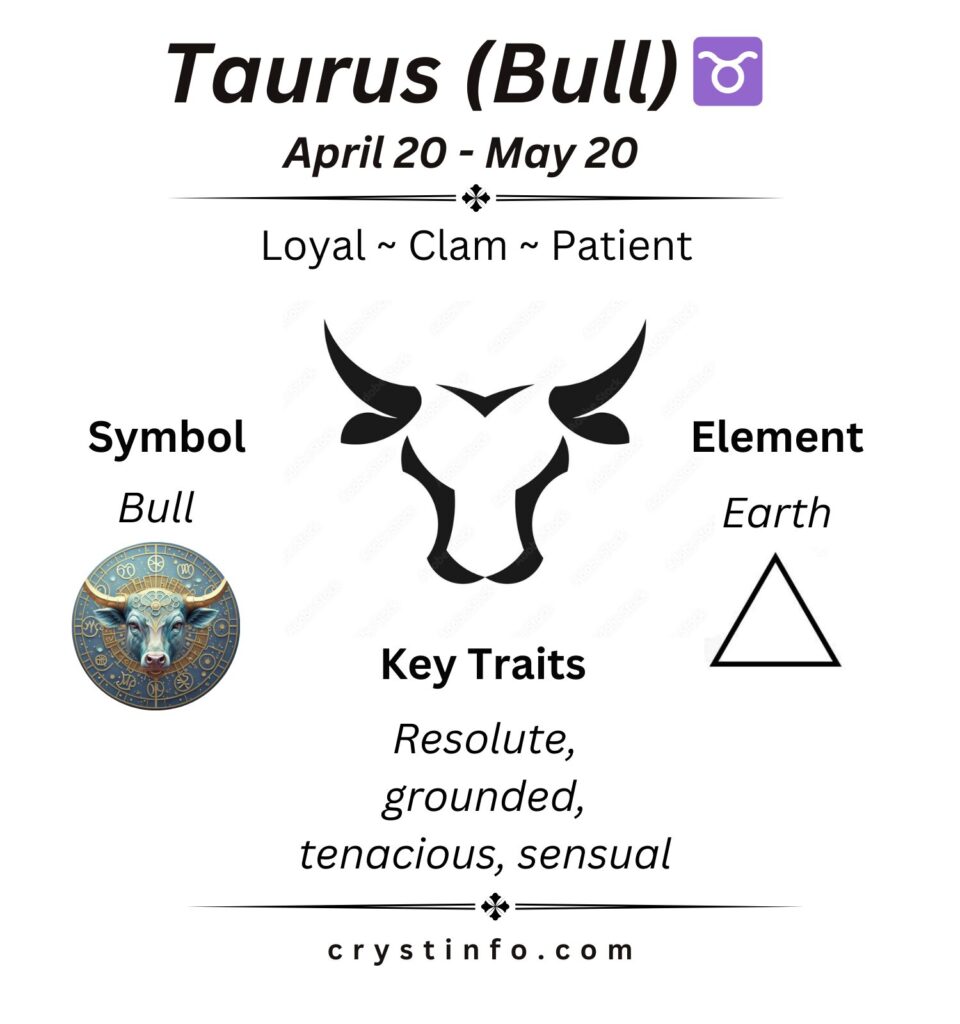
Taurus: The Constellation
| Taurus Traits | Description |
|---|---|
| Symbol | The Bull |
| Ruling Planet | Venus |
| Ruling House | Second House of Income |
| Key Traits | Resolute, grounded, tenacious, sensual |
- Astronomical Characteristics:
- Taurus is a zodiacal constellation situated in the northern sky, positioned between Aries and Gemini.
- Its coordinates are approximately 4 hours 20 minutes right ascension and 16° north declination.
- The brightest star in the constellation is Aldebaran, also known as Alpha Tauri, which ranks as the 14th brightest star in the sky with a magnitude of 0.85.
- Notable features within the constellation include the Crab Nebula (M1) and the Pleiades and Hyades star clusters.
Symbolism of Taurus as a Bull
- Astrological Significance:
- In astrology, Taurus is the second sign of the zodiac, governing from approximately April 20 to May 20.
- The symbol of Taurus as a bull stems from Greek mythology, specifically the tale of Zeus, who transformed into a bull to abduct Europa.
- Mythological Associations:
- According to Greek myth, Zeus, the king of the gods, assumed the form of a bull to seduce and abduct Europa, a Phoenician princess.
Traits of Taurus in Astrology
- Earthly and Sensual Nature:
- Taurus is represented as an earth sign symbolized by the bull.
- Individuals born under the sign of Taurus are known for their love of comfort and indulgence in sensory pleasures.
- They enjoy serene and tranquil environments, surrounded by soothing sights, sounds, and flavors.
- Relaxation and Enjoyment:
- Taureans are inclined towards indulging in luxurious experiences such as long baths, massages, and gourmet meals.
- They appreciate bucolic settings and seek relaxation and enjoyment in their surroundings.
Overall, Taurus embodies qualities of stability, sensuality, and earthly pleasures, finding contentment in the simple joys of life and the comforts of the natural world.
Gemini (Twins): May 21–June 21:
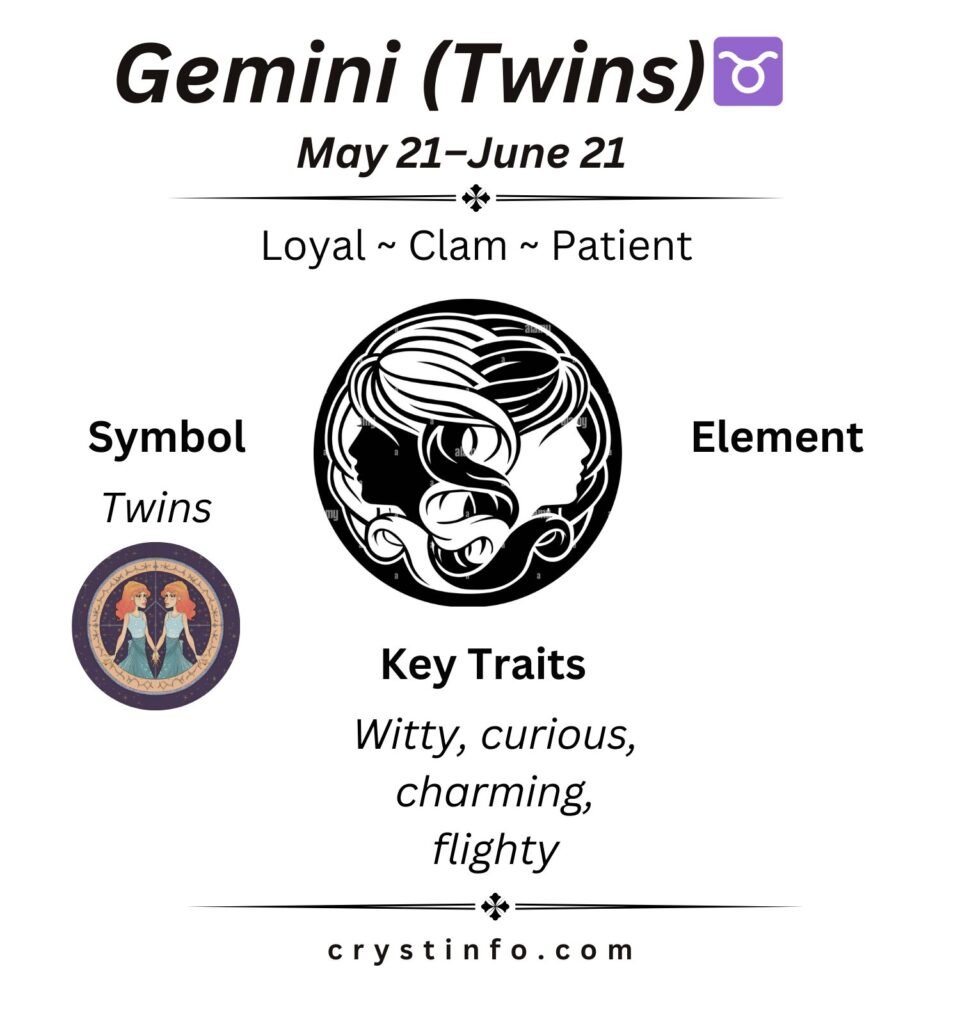
Gemini: The Constellation
| Gemini Traits | Description |
|---|---|
| Symbol | The Twins |
| Ruling Planet | Mercury |
| Ruling House | Third House of Communication |
| Key Traits | Witty, curious, charming, flighty |
- Astronomical Characteristics:
- Gemini is a zodiacal constellation located in the northern sky, positioned between Cancer and Taurus.
- Its coordinates are approximately 7 hours right ascension and 22° north declination.
- The brightest stars in Gemini are Castor and Pollux (Alpha and Beta Geminorum), with Pollux being the brighter of the two, boasting a magnitude of 1.15.
- The summer solstice, the northernmost point reached by the Sun during its annual journey among the stars, lies within the boundaries of Gemini.
- Additionally, Gemini contains the isolated pulsar Geminga.
Symbolism of Twins in Gemini
- Astrological Significance:
- In astrology, Gemini is recognized as the third sign of the zodiac, governing the period from approximately May 21 to June 21.
- It is symbolized by a pair of twins, representing duality and versatility.
- Mythological Associations:
- The twins in Gemini are often identified as Castor and Pollux, two prominent figures from Greek mythology.
- They have also been linked to other legendary pairs, such as the younger and older Horus or Romulus and Remus.
Personality Traits of Gemini in Astrology
- Spontaneous and Curious Nature:
- Gemini individuals are characterized by their spontaneity, playfulness, and insatiable curiosity.
- They are driven by their desire to explore various interests and pursue diverse experiences.
- Symbol of Duality:
- Represented by the celestial twins, Gemini embodies the concept of duality and adaptability.
- Gemini’s versatile nature allows them to engage in multiple pursuits simultaneously, often juggling various tasks and interests.
Overall, Gemini is a dynamic and intellectually curious sign, known for its lively and multifaceted personality. With an innate ability to adapt to diverse situations, Geminis thrive in environments that stimulate their intellect and creativity.
Cancer (Crab): June 22–July 22:

Cancer: The Constellation
| Cancer Traits | Description |
|---|---|
| Symbol | The Crab |
| Ruling Planet | Moon |
| Ruling House | Fourth House of Home Life |
| Key Traits | Compassionate, giving, sentimental, nurturing |
- Astronomical Characteristics:
- Cancer is a zodiacal constellation situated in the northern sky, positioned between Leo and Gemini.
- Its coordinates are approximately 8 hours 25 minutes right ascension and 20° north declination.
- Notable features within Cancer include the well-known star cluster called Praesepe, or the Beehive.
- The brightest star in Cancer is Al Tarf (Arabic for “the end” of one of the crab’s legs), also known as Beta Cancri, although it has a relatively dim magnitude of 3.6.
Symbolism of the Crab in Cancer
- Astrological Significance:
- In astrology, Cancer is recognized as the fourth sign of the zodiac, governing the period from about June 22 to about July 22.
- It is symbolized by a crab, lobster, or crayfish, representing Cancer’s association with the oceanic realm and emotional depth.
- Mythological Associations:
- The representation of Cancer as a crab is linked to Greek mythology, particularly the crab that pinched Heracles during his battle with the Lernaean hydra.
- Crushed by Heracles, the crab was rewarded by Heracles’ enemy, Hera, by being placed among the stars as the constellation Cancer.
Personality Traits of Cancer in Astrology
- Emotional Depth and Intuition:
- Cancer individuals are known for their high level of emotional sensitivity and intuition.
- Their psychic abilities often manifest in tangible spaces, allowing them to navigate the emotional and material realms with ease.
- Protective Nature:
- Similar to the hard-shelled crustaceans, Cancers are willing to do whatever it takes to protect themselves emotionally.
- They establish trust slowly and cautiously, but once trust is earned, they become fiercely loyal and protective of their loved ones.
Overall, Cancer is characterized by its ability to seamlessly transition between the realms of emotions and practicality, embodying qualities of intuition, nurturing, and protection. Understanding Cancer’s complex nature requires patience and empathy, as they navigate the depths of their emotions with resilience and grace.
Leo (Lion): July 23–August 22:

Leo: The Constellation
| Leo Traits | Description |
|---|---|
| Symbol | The Lion |
| Ruling Planet | Sun |
| Ruling House | Fifth House of Romance and Self-Expression |
| Key Traits | Charismatic, generous, optimistic, dramatic |
- Astronomical Characteristics:
- Leo is a zodiacal constellation situated in the northern sky, lying between Cancer and Virgo.
- Its approximate coordinates are 10 hours 30 minutes right ascension and 15° north declination.
- The brightest star in Leo is Regulus (Latin for “little king”), also known as Alpha Leonis, with a magnitude of 1.35.
- The November meteor shower called the Leonids has its radiant, or point of apparent origin, in Leo.
- Many stars in Leo form an asterism called the Sickle.
Symbolism of the Lion in Leo
- Astrological Significance:
- In astrology, Leo is recognized as the fifth sign of the zodiac, governing the period from about July 23 to about August 22.
- It is symbolized by a lion, often associated with the Nemean lion slain by Heracles (Hercules) as part of his 12 Labours.
- Mythological Associations:
- The representation of Leo as a lion is linked to Greek mythology, particularly the Nemean lion, which was a formidable beast slain by Heracles.
- Heracles defeated the lion as part of his penance for killing his wife and children, and the lion’s hide became his protective cloak.
Personality Traits of Leo in Astrology
- Passionate and Dramatic:
- Leo individuals are known for their passionate and theatrical nature, often seeking the spotlight and celebrating themselves.
- They exude confidence and charm, embracing their royal status with vivacity and flair.
- Loyalty and Leadership:
- Leos are fiercely loyal to their loved ones and possess strong leadership qualities.
- They enjoy being admired and respected by others, and they excel in positions of authority and influence.
Overall, Leo is characterized by its regal and charismatic demeanor, embodying traits of leadership, loyalty, and theatricality. Leos thrive in environments where they can shine brightly and command attention, embracing their role as the kings and queens of the celestial jungle.
Virgo (Virgin): August 23–September 22:
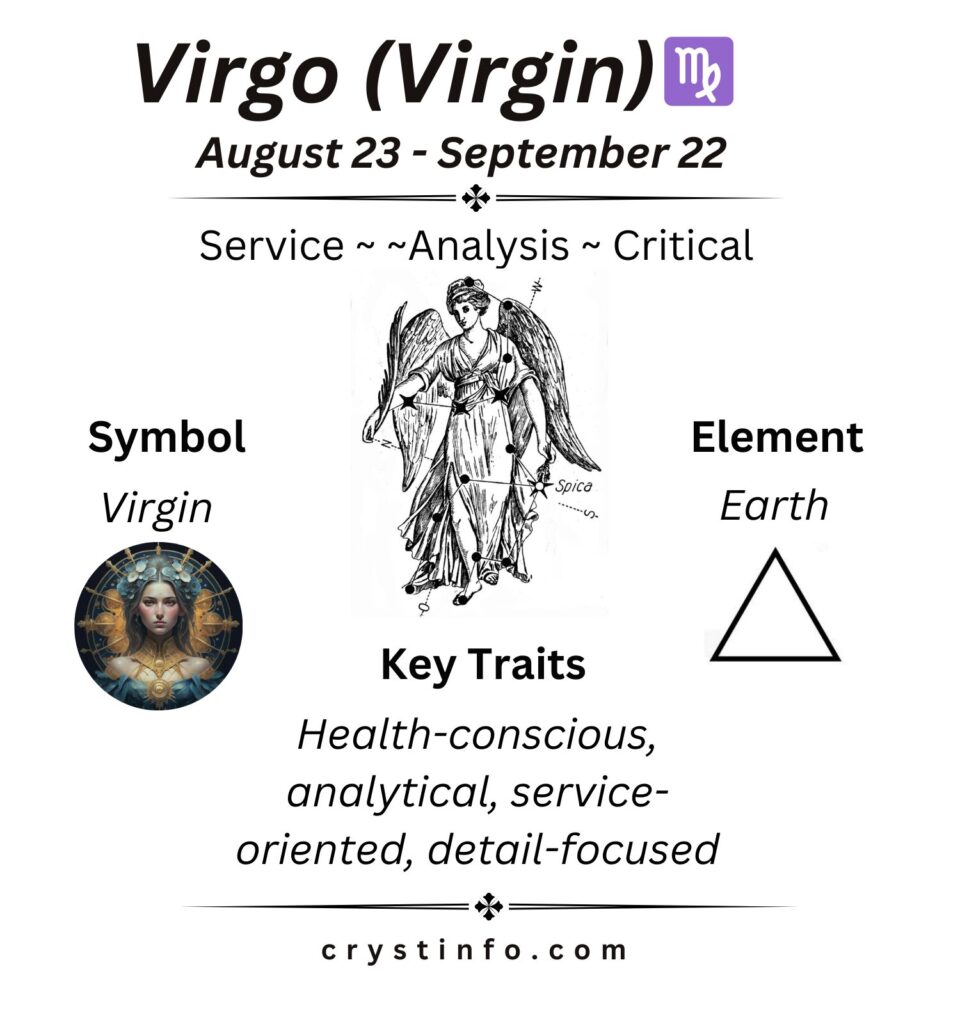
Virgo: The Constellation
| Virgo Traits | Description |
|---|---|
| Symbol | The Virgin or Maiden |
| Ruling Planet | Mercury |
| Ruling House | Sixth House of Wellness and Daily Routine |
| Key Traits | Health-conscious, analytical, service-oriented, detail-focused |
- Astronomical Characteristics:
- Virgo is a zodiacal constellation situated in the southern sky, lying between Leo and Libra.
- Its approximate coordinates are 13 hours right ascension and 2° south declination.
- The constellation’s brightest star is Spica (Latin for “head of grain” or Alpha Virginis), with a magnitude of 1.04.
- Virgo contains the Virgo cluster, the nearest large cluster of galaxies, and PSR 1257+12, the pulsar around which the first extrasolar planets were discovered in 1992.
Symbolism of Virgo in Astrology
- Astrological Significance:
- In astrology, Virgo is recognized as the sixth sign of the zodiac, governing the period from about August 23 to about September 22.
- It is symbolized by a young maiden carrying a sheaf of wheat.
- Mythological Associations:
- The representation of Virgo as a maiden is associated with various fertility goddesses and harvest maidens from different mythologies.
- Examples include Ishtar from Babylonian and Assyrian mythology, Persephone from Greek mythology, and others.
Personality Traits of Virgo in Astrology
- Logical and Practical:
- Virgos are known for their logical, practical, and systematic approach to life.
- They have a keen attention to detail and strive for perfection in everything they do.
- Deep-rooted Presence in the Material World:
- Represented by the goddess of wheat and agriculture, Virgos have a deep-rooted connection to the material world.
- They are diligent, consistent, and unafraid to put in the hard work necessary for improvement.
- Perfectionism and Diligence:
- Virgos are perfectionists at heart and continually seek to improve their skills through diligent and consistent practice.
- They have a strong sense of duty and are reliable and trustworthy individuals.
Overall, Virgos are characterized by their practicality, attention to detail, and commitment to excellence. They excel in roles that require organization, precision, and analytical thinking, contributing their valuable skills to the world around them.
Libra (Balance): September 23–October 23:
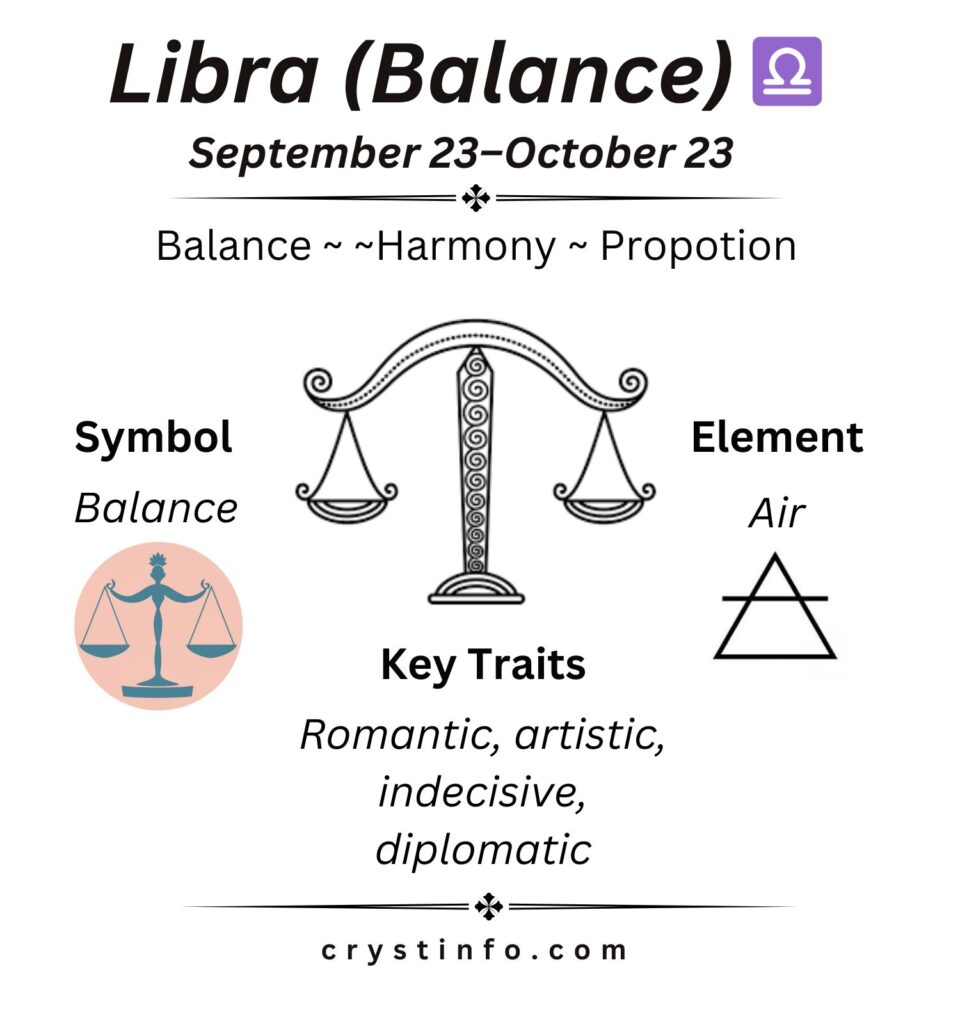
Libra: The Constellation
| Libra Traits | Description |
|---|---|
| Symbol | The Scales |
| Ruling Planet | Venus |
| Ruling House | Seventh House of Partnership |
| Key Traits | Romantic, artistic, indecisive, diplomatic |
- Astronomical Features:
- Libra is a zodiacal constellation situated in the southern sky, lying between Scorpius and Virgo.
- It is positioned at approximately 15 hours 30 minutes right ascension and 15° south declination.
- The stars in Libra are relatively faint, with Zubeneschamali (Beta Librae) being the brightest star, with a magnitude of 2.6.
Astrological Significance of Libra
- Seventh Zodiac Sign:
- In astrology, Libra is recognized as the seventh sign of the zodiac, governing the period from about September 22 to about October 23.
- It is symbolized by a woman holding a balance scale or by the balance alone.
Legend and Symbolism of Libra
- Representation:
- Libra is often represented by a woman, sometimes identified with Astraea, the Roman goddess of justice.
- The symbol of the balance scale reflects Libra’s association with balance, harmony, and justice.
Personality Traits of Libra in Astrology
- Obsession with Balance and Harmony:
- Libra energy is characterized by a strong desire for balance, harmony, and justice in all aspects of life.
- As a cardinal air sign, Libras are driven to establish equilibrium and symmetry in their relationships and surroundings.
- Focus on Establishing Equilibrium:
- Libras are fixated on creating equilibrium and symmetry, especially in matters of the heart and interpersonal relationships.
- They strive to maintain harmony and fairness in their interactions with others.
- Justice and Fairness:
- Represented by the scales, Libras have a deep-seated sense of justice and fairness.
- They are driven to ensure that decisions are made impartially and that everyone is treated equitably.
Libras are known for their diplomatic nature, charm, and commitment to fairness and justice. They excel in roles that require mediation, negotiation, and maintaining harmony in relationships and environments.
Scorpius (Scorpion): October 24–November 21:
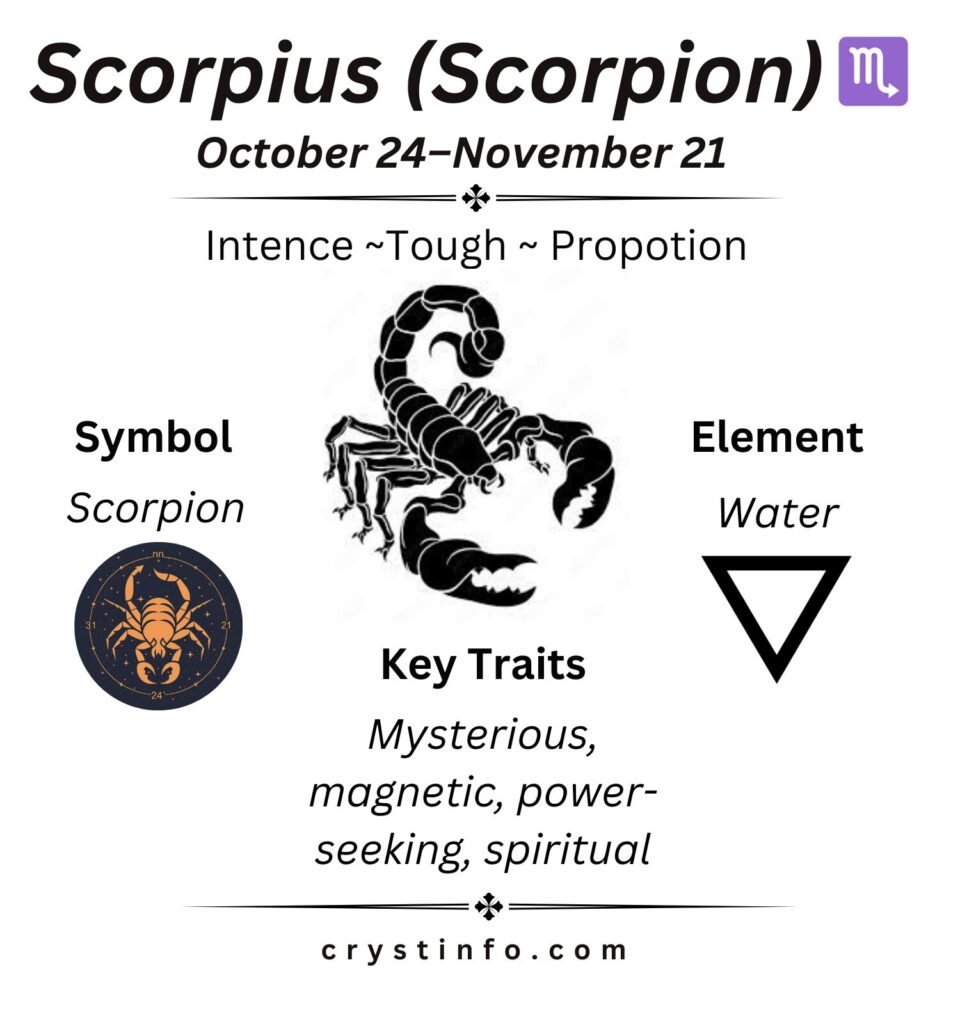
Scorpius: The Constellation
| Scorpio Traits | Description |
|---|---|
| Symbol | The Scorpion |
| Ruling Planets | Pluto and Mars |
| Ruling House | Eighth House of Emotional Bonds and Sexual Intimacy |
| Key Traits | Mysterious, magnetic, power-seeking, spiritual |
- Astronomical Features:
- Scorpius is a zodiacal constellation located in the southern sky, lying between Libra and Sagittarius.
- Positioned at approximately 16 hours 30 minutes right ascension and 30° south declination.
- Its brightest star, Antares (Alpha Scorpii), is the 15th brightest star in the sky, with a magnitude of 1.1.
Astrological Significance of Scorpio
- Eighth Zodiac Sign:
- In astrology, Scorpio (or Scorpius) is recognized as the eighth sign of the zodiac, governing the period from about October 24 to about November 21.
- It is symbolized by a scorpion, drawing from Greek mythology.
Greek Myths and Symbolism
- Scorpion and Orion:
- The representation of Scorpio as a scorpion is linked to the Greek legend of the scorpion that stung Orion to death.
- According to Greek mythology, Orion sets as Scorpius rises in the sky, symbolizing their eternal conflict.
- Sun’s Horses and Phaeton:
- Another Greek myth associates Scorpio with the horses of the Sun bolting when driven by the inexperienced youth Phaeton.
- The scorpion’s actions caused chaos and disaster, illustrating the power and impact of Scorpio’s influence.
Personality Traits of Scorpio in Astrology
- Elusive and Mysterious:
- Scorpio is characterized as elusive and mysterious, often misunderstood due to its complex nature.
- It is a water sign that utilizes emotional energy as fuel, cultivating profound wisdom through both the seen and unseen realms.
- Psychic Abilities and Courage:
- Scorpio derives extraordinary courage from its psychic abilities, making it one of the most dynamic and complex signs of the zodiac.
- Despite its enigmatic nature, Scorpio possesses deep insight and emotional depth, allowing it to navigate the complexities of life with courage and resilience.
Scorpios are known for their intense passion, emotional depth, and unwavering determination. They possess a keen intuition and profound insight into human nature, making them adept at understanding and navigating the complexities of relationships and life experiences.
Sagittarius (Archer): November 22–December 21:

Sagittarius: The Constellation
| Sagittarius Traits | Description |
|---|---|
| Symbol | The Archer |
| Ruling Planet | Jupiter |
| Ruling House | Ninth House of Adventure and Higher Learning |
| Key Traits | Philosophical, free-spirited, unfiltered, wanderlusting |
- Astronomical Features:
- Sagittarius is a zodiacal constellation situated in the southern sky, lying between Capricornus and Scorpius.
- Positioned at approximately 19 hours right ascension and 25° south declination.
- The centre of the Milky Way Galaxy lies in the radio source Sagittarius A*.
Astrological Significance of Sagittarius
- Ninth Zodiac Sign:
- In astrology, Sagittarius is acknowledged as the ninth sign of the zodiac, governing the period from about November 22 to about December 21.
- It is symbolized by either a centaur shooting a bow and arrow or by an arrow drawn across a bow.
Babylonian Influence and Symbolism
- Mounted Archer Symbolism:
- Sagittarius was identified as a mounted archer by the Babylonians as early as the 11th century BCE.
- This representation highlights Sagittarius’ association with exploration, adventure, and quest for knowledge.
Personality Traits of Sagittarius in Astrology
- Quest for Knowledge and Adventure:
- Sagittarius, a fire sign, is known for its boundless curiosity and adventurous spirit.
- Represented by the archer, Sagittarians embark on journeys for geographical, intellectual, and spiritual pursuits.
- Exploration and Pursuit of Truth:
- Like blazing arrows, Sagittarians launch into various endeavors, driven by a thirst for exploration and a desire to uncover truth and meaning.
- They thrive on challenges and seek to expand their horizons through new experiences and encounters.
- Freedom and Independence:
- Sagittarians value freedom and independence, resisting constraints and limitations that hinder their ability to explore and grow.
- They are optimistic, optimistic, and resilient, capable of adapting to change and embracing the unknown with enthusiasm and courage.
Sagittarians are characterized by their adventurous nature, insatiable curiosity, and optimistic outlook on life. They approach challenges with confidence and resilience, always striving to expand their horizons and seek deeper understanding and truth in the world around them.
Capricornus (Goat): December 22–January 19:
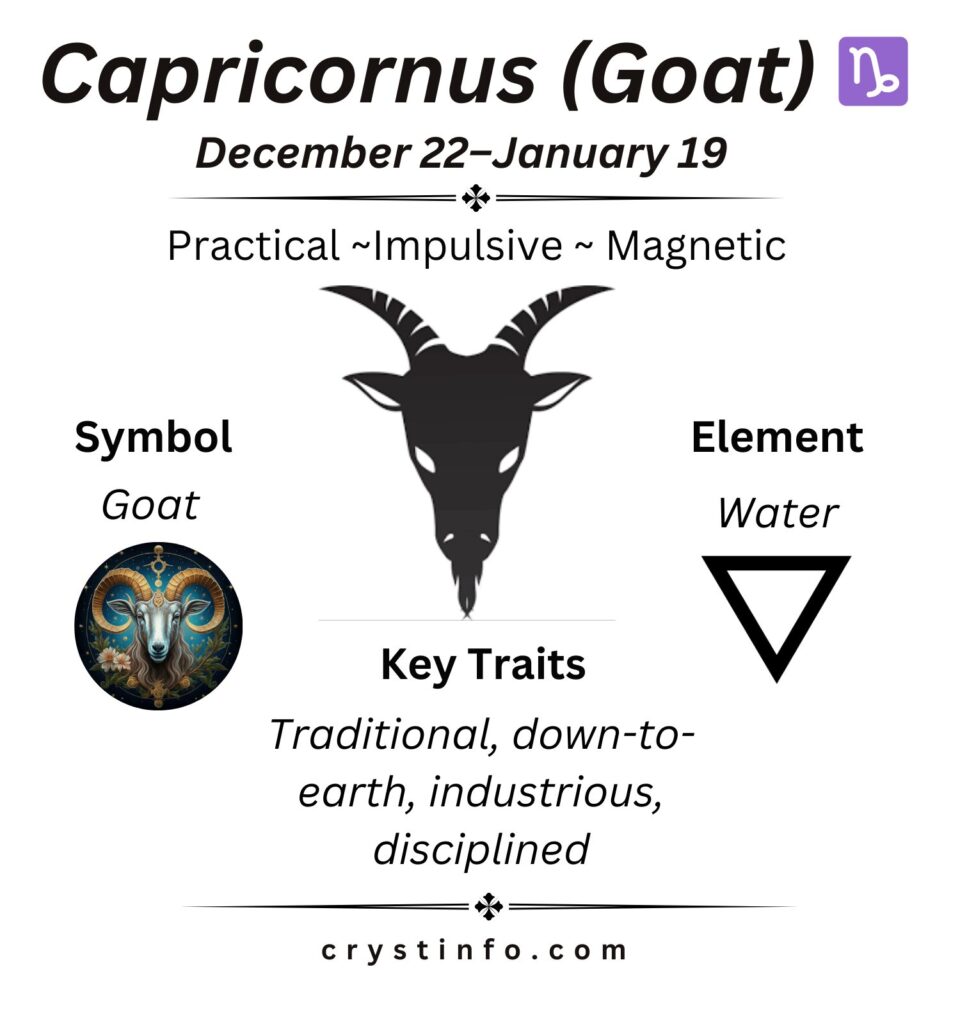
Capricorn: The Constellation
| Capricorn Traits | Description |
|---|---|
| Symbol | The Goat |
| Ruling Planet | Saturn |
| Ruling House | Tenth House of Career and Public Image |
| Key Traits | Traditional, down-to-earth, industrious, disciplined |
- Astronomical Features:
- Capricornus is a zodiacal constellation situated in the southern sky between Aquarius and Sagittarius.
- It is positioned at approximately 21 hours right ascension and 20° south declination.
- The brightest star in Capricornus is Deneb Algedi, with a magnitude of 2.9.
Astrological Significance of Capricorn
- Tenth Zodiac Sign:
- Capricorn is recognized as the tenth sign of the zodiac, governing the period from about December 22 to about January 19.
- It is symbolized by the sea-goat, a mythological creature with the body of a goat and the tail of a fish.
Mythological Origin and Symbolism
- Pan and the Fishtail:
- The representation of Capricorn with a fishtail finds its origin in Greek mythology, specifically the myth of Pan.
- Pan, to avoid the monster Typhon, transformed into animal shape and jumped into the water, resulting in the upper half taking the form of a goat and the lower half becoming a fish.
Personality Traits of Capricorn in Astrology
- Ambition and Perseverance:
- Capricorns are characterized by their unwavering ambition, patience, and dedication to achieving their goals.
- They understand the value of time and are committed to climbing the metaphorical mountain of success through hard work and perseverance.
- Skillful Navigation of Realms:
- Represented by the sea-goat, Capricorns possess the ability to navigate both the material and emotional realms adeptly.
- They are practical, pragmatic, and strategic in their approach to life, balancing their aspirations with a grounded understanding of reality.
- Resilience and Adaptability:
- Capricorns exhibit resilience and adaptability in the face of challenges, drawing strength from their inner determination and sense of responsibility.
- They are resourceful problem-solvers who thrive in environments that demand discipline, structure, and accountability.
Capricorns are driven by a strong sense of purpose and a desire to leave a lasting impact in their endeavors. They embrace challenges as opportunities for growth, relying on their innate resilience and steadfast determination to overcome obstacles and achieve success.
Aquarius (Water Bearer): January 20–February 18:

Aquarius: The Constellation
| Aquarius Traits | Description |
|---|---|
| Symbol | The Water Bearer |
| Ruling Planet | Uranus |
| Ruling House | Eleventh House of Networking |
| Key Traits | Humanitarian, eccentric, individualistic, cool |
- Astronomical Position:
- Aquarius is a zodiacal constellation situated in the southern sky between Capricornus and Pisces.
- It is positioned at approximately 22 hours right ascension and 10° south declination.
- Despite lacking striking features, its brightest star, Sadalmelik, has a magnitude of 3.0.
Ancient Babylonian Views on Aquarius
- Governance Period:
- In astrology, Aquarius is said to govern from about January 20 to about February 18.
Astrological Significance of Aquarius
- Eleventh Zodiac Sign:
- Aquarius is recognized as the eleventh sign of the zodiac, following Capricorn and preceding Pisces.
- Its representation as a man pouring a stream of water out of a jug has historical significance.
The Symbolism of Aquarius in Astrology
- The Water Bearer:
- Aquarius is symbolized by a male figure holding an inverted bowl from which water flows, forming the constellation.
- This representation is believed to have originated from ancient times when the rising of Aquarius coincided with periods of floods and rain in the Middle East.
- Humanitarianism and Innovation:
- Individuals born under the sign of Aquarius are often associated with traits such as humanitarianism, innovation, and independence.
- They are known for their progressive thinking, originality, and commitment to social causes.
- Intellectualism and Open-Mindedness:
- Aquarians are typically characterized by their intellectual curiosity, open-mindedness, and unconventional approach to life.
- They value freedom of thought and are drawn to pursuits that allow them to explore new ideas and challenge traditional norms.
- Community and Friendship:
- Friendship and community are important to Aquarians, who thrive in environments that foster collaboration, diversity, and mutual respect.
- They are natural visionaries who seek to inspire positive change and contribute to the collective well-being of society.
Aquarians are heralded for their visionary spirit and commitment to advancing humanity through innovation, compassion, and social progress. As forward-thinkers and catalysts for change, they play a vital role in shaping the future of our world.
Pisces (Fish): February 19–March 20:
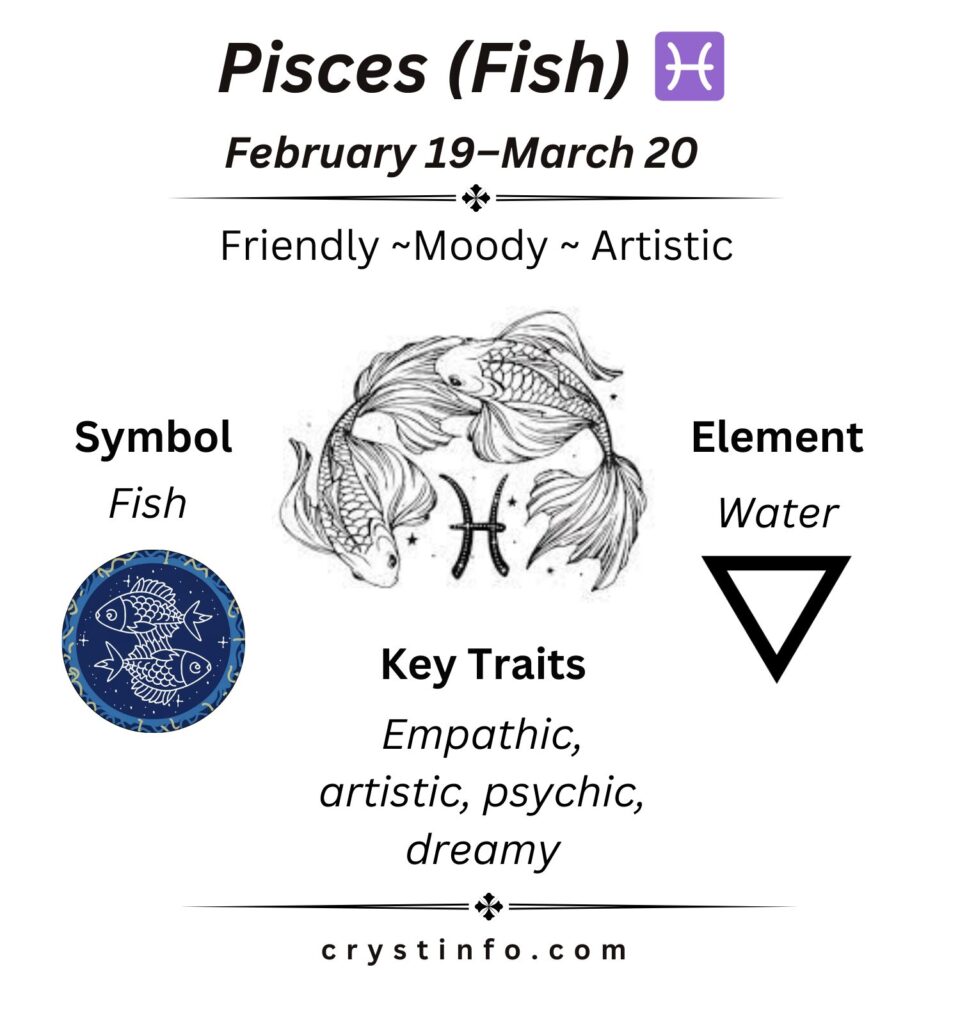
Pisces: The Constellation
| Pisces Traits | Description |
|---|---|
| Symbol | The Fish |
| Ruling Planets | Neptune |
| Ruling House | Twelfth House of Spirituality |
| Key Traits | Empathic, artistic, psychic, dreamy |
- Astronomical Position:
- Pisces is a zodiacal constellation located in the northern sky between Aries and Aquarius.
- It is situated at approximately 1 hour right ascension and 15° north declination.
- The vernal equinox, marking the Sun’s northward journey across the celestial equator, lies within Pisces.
Astrological Significance of Pisces
- Twelfth Zodiac Sign:
- In astrology, Pisces is recognized as the twelfth and final sign of the zodiac.
- It governs the period from about February 19 to about March 20.
Symbolism of Pisces in Astrology
- Representation of Two Fish:
- Pisces is symbolized by two fish tied together, often linked to the Greek myth of Aphrodite and Eros.
- According to the myth, they transformed into fish to escape the monster Typhon, or alternatively, the fish that carried them to safety.
- Psychic Sensitivity and Empathy:
- Pisces is renowned for its intuitive, sensitive, and empathetic nature.
- As the final sign of the zodiac, Pisces has assimilated the lessons learned by all the other signs, embodying both the joys and pains, hopes and fears of the human experience.
- Dual Nature of Pisces:
- The symbol of two fish swimming in opposite directions represents Pisces’ constant internal struggle between fantasy and reality.
- Individuals born under Pisces are often torn between their imaginative, dreamy side and their need to navigate the practicalities of everyday life.
- Emotional Depth and Spiritual Connection:
- Pisceans are deeply emotional and spiritually attuned beings who possess a profound connection to the unseen realms.
- They are naturally inclined towards artistic expression, introspection, and seeking meaning beyond the material world.
- Empathetic and Compassionate:
- Compassion and empathy are hallmark traits of Pisceans, who possess a natural inclination towards understanding and supporting others.
- They excel in nurturing relationships and creating harmonious environments where emotional depth and vulnerability are valued.
Pisces embodies the culmination of the zodiac journey, representing the synthesis of human experience and the universal quest for spiritual enlightenment and emotional fulfillment. As compassionate and intuitive souls, Pisceans enrich the world with their boundless empathy and profound insight into the human condition.
Why Do We Believe In Astrology?
Astrology provides solace, faith, and a more profound comprehension of the world we live in, despite not being a religion. While predictions about the future are frequently given, interpretations are primarily meant to provide us with tools to meet ourselves and see our inner worlds from a different perspective, as well as to help us resolve our problems and strengthen our bonds with friends, family, and partners.
- Purposeful Universe:
- Astrology asserts that events in life have meaning and are not coincidental.
- It offers explanations for occurrences and guides individuals forward.
- Astrology’s Impact:
- Regularly visiting astrologers or reading horoscopes often leads to a sense of fulfillment and satisfaction.
- While accuracy in predictions may vary, the experience of having a horoscope cast can be fulfilling.
- Celestial Influence:
- Despite the signs not aligning with constellations anymore, astrology suggests that Earth remains under seasonal and planetary influences.
- Many people find comfort and guidance in their horoscope dates and sign meanings.
- Insight and Understanding:
- Astrology provides insights into personality traits, strengths, weaknesses, and natural qualities.
- It helps individuals understand themselves and the world around them better.
- Horoscope Compatibility:
- Astrology aids in determining compatibility in relationships.
- Understanding love potential can improve relationships with other zodiac signs.
- Career Guidance:
- Astrology considers both birth potential and planetary influences on personal horoscopes.
- It assists in choosing suitable career paths and educational pursuits for success and fulfillment.
Unique Personalized Insights
- Birth Chart Significance:
- Astrology views a birth chart as a blueprint of one’s life created at birth.
- Each planet’s placement in the horoscope reveals insights into personality and destiny.
- Life Conditions and Geographic Location:
- Astrocartography identifies varying life conditions based on geographic locations.
- By comparing one’s natal chart to different areas globally, individuals can determine potentially successful locations.
Astrology’s appeal lies in its ability to offer personalized insights, guidance, and understanding of oneself and the world. While opinions on its efficacy may vary, many find comfort and meaning in its principles and practices.
Conclusion:
In summary, delving into the realm of zodiac signs provides a captivating avenue for self-discovery and understanding. Whether approached with skepticism or belief, astrology offers insights that resonate with many. It encourages introspection, empathy, and a deeper connection to the universe. Regardless of our stance, the study of zodiac signs invites us to contemplate life’s mysteries and find meaning in the cosmic symphony of existence.
FAQs:
1. Are zodiac signs scientifically proven? While many aspects of astrology are not scientifically verifiable, the study of zodiac signs is rooted in ancient traditions and cultural beliefs rather than empirical evidence. However, astrology continues to intrigue and resonate with people worldwide.
2. Can zodiac signs really predict the future? Astrology suggests that zodiac signs can offer insights into personality traits, tendencies, and potential life experiences based on the positions of celestial bodies at the time of birth. However, it’s important to approach predictions with a critical mind and understand that they are not deterministic.
3. Do people of the same zodiac sign have identical personalities? While individuals born under the same zodiac sign may share certain characteristics, personalities are influenced by various factors such as upbringing, environment, and life experiences. Therefore, while zodiac signs can provide general tendencies, each person is unique.
4. Can zodiac compatibility determine the success of relationships? Astrology suggests that certain zodiac signs may be more compatible with each other based on their elemental traits and astrological profiles. However, the success of a relationship depends on numerous factors, including communication, mutual respect, and shared values, which extend beyond zodiac compatibility.
5. Is there any harm in exploring zodiac signs? Exploring zodiac signs can be a fun and insightful way to gain self-awareness and understand interpersonal dynamics. However, it’s essential to maintain a balanced perspective and not overly rely on astrology for major life decisions or to stereotype individuals based on their signs. Ultimately, how one engages with astrology is a personal choice.

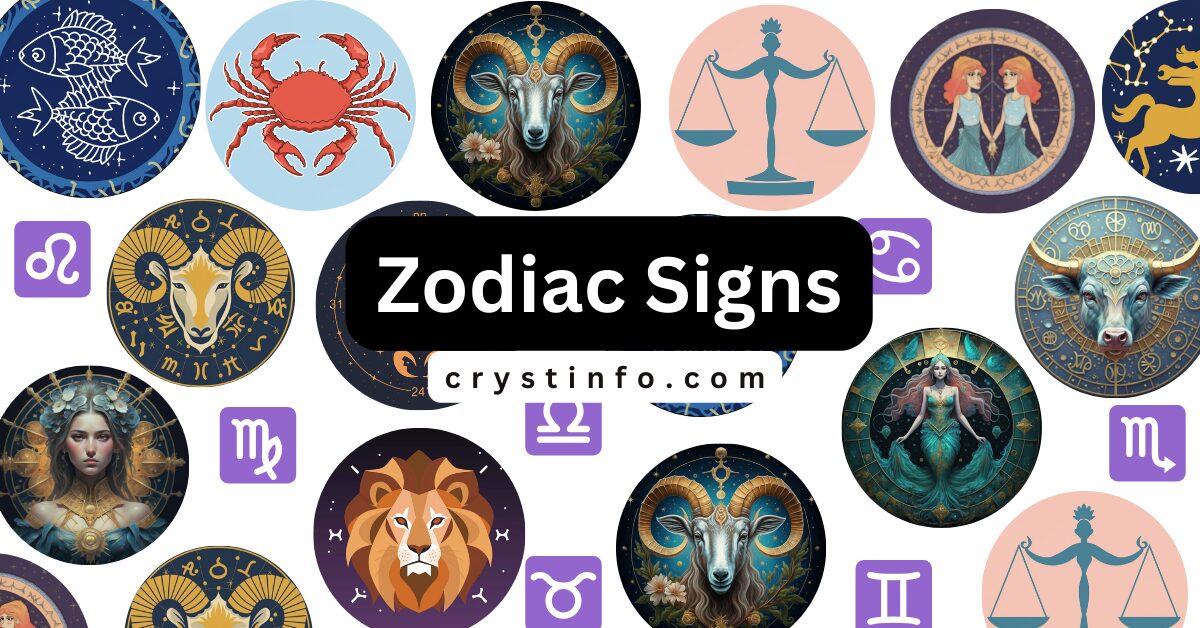
![Snowflake Obsidian: Unleashing Healing Energies for Your [Well-being]](https://crystinfo.com/wp-content/uploads/2023/12/Add-a-heading-15-768x402.jpg)


![Milky Quartz Mastery: Unraveling the Power Within [Guide]](https://crystinfo.com/wp-content/uploads/2024/01/Blue-Goldstone-12-768x402.jpg)
![Mahogany Obsidian: Unveiling its [Meanings] and Properties](https://crystinfo.com/wp-content/uploads/2024/01/Chakras-9-768x402.jpg)
![White Crystals: Explore Meaning, Types & Healing Properties [Guide]](https://crystinfo.com/wp-content/uploads/2023/12/Blue-Goldstone-1-768x402.jpg)